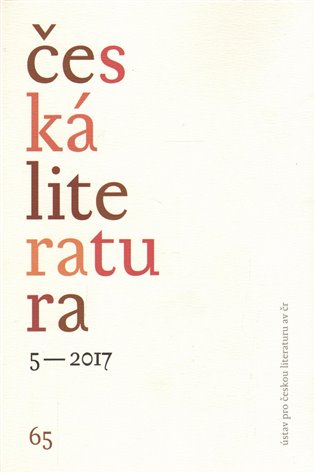Evangelium za časů normalizace: „nový“ Hrabal překonává „starého“ Hrabala
The Gospel under normalization: the “new” Hrabal supersedes the “old” Hrabal
Author(s): Jakub ČeškaSubject(s): Language and Literature Studies, Studies of Literature, Czech Literature
Published by: AV ČR - Akademie věd České republiky - Ústav pro českou literaturu
Keywords: Hrabal Bohumil;Hrabal, Bohumil;reading process;reading procedures;normalization;Rzounek Vítězslav;censorship;censorship / cenzura;
Summary/Abstract: This study focuses on the Československý spisovatel publishers’ reading procedures for Hrabal’s output in the latter half of the 1970s. To be specific, it deals with their reading of Postřižiny (Cutting It Short, 1975), Slavnosti sněženek (Snowdrop Festival, 1977), Krasosmutnění (Joyful Blues/Beautiful Sadness, 1977–8) and the short story collection Každý den zázrak (Every Day a Miracle, 1978). As these procedures took place against a backdrop of dispersed censorship supervision (with socially ‘unreliable’ authors, such as Hrabal, being read by ‘superreaders’, who were representatives of focused ideological supervision) I compare their structure with that of reading procedures in the 1960s. Whereas censorship in the 1960s was an external supervision institution (i.e. the Central Press Supervision Authority), the proofreaders and editors intuitively anticipated its possible objections and reflected them to some extent in their standpoints, during the 1970s the supervision institution in the form of superreaders moved right into the editorial office. However, one should not assume there was a conflict between the editors and the superreaders purely from the definition of their roles. In the three cases under review, two superreaders were assigned to one title (only one in the case of Postřižiny), but their opinions differ — what would have got past one of them is pulled up by the other one (this is particularly the case for the short story collection Každý den zázrak — Every Day a Miracle). Hence not even the superreaders can be considered a priori to be critics of Hrabal’s apolitical style, and in the given case it is Vítězslav Rzounek, who surprisingly becomes an apologist for Hrabal’s 1960s short story work. Hence this study follows the readers’ assessments in detail: their argument structure, apparent and hidden apologetics (necessarily ambivalent due to the very nature of the reading procedure) and their thematic synopsis; of course, it also focuses on the overall reading procedure mechanism. I endeavour to reveal the significant way (but nothing like as significant as normally supposed) in which the readers’ objections were reflected in Hrabal’s subsequent work. It can even be said that in the 1970s Hrabal is a different kind of writer than he was during the 1960s (when he repeatedly reworked his entire oeuvre). Now he was very sparing in his text interventions, while it can be said that in no significant way do these changes diminish the artistic value of his work. A look at the reading procedure in the latter half of the 1970s lets us see the extent to which Hrabal became a compact writer, who only slightly retreats before the pressure of the times (and the editors, including the superreaders’ opinions). The primary topic of the reading procedure turns into the ongoing replacement of the ‘old’ (meaning the 1960s literary output) Hrabal by the ‘new’ one who wrote his works in the 1970s. Those who have assessed this find him more sensitive without being unhealthily sentimental, offering a more socially aware standpoint, criticizing the petty bourgeoisie while jettisoning decadent trends that were now passé, i.e. existentialism, late surrealism and not least eccentrically erotic motifs. Using the superreaders’ metaphors, we can detect a more general literary topos behind this subject matter, which points the way towards a New Deal (or Testament) which supersedes the old one by showing it in a new light. Hence the ‘new’ Hrabal presents readers at that time with the promise of the arrival of a better society.
Journal: Česká literatura
- Issue Year: 65/2017
- Issue No: 5
- Page Range: 689-725
- Page Count: 37
- Language: Czech

